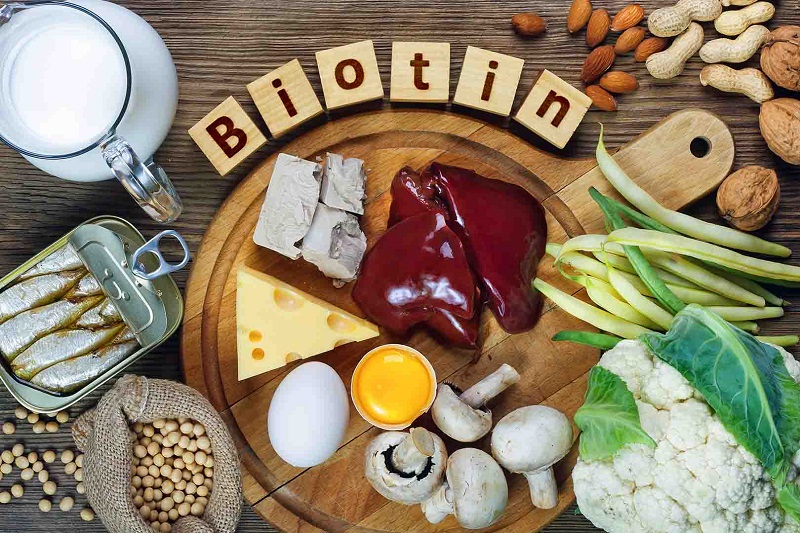Biotin Rich Foods for Vegetarian

Although some vitamins are better known and some are less discussed, all vitamins are necessary for our health. Therefore, it is better to enrich our diet by reading about lesser-known vitamins and their sources. One of these lesser known vitamins is biotin
What is biotin?
Biotin is one of the B vitamins that helps convert food into energy in the body. Other names are biotin, vitamin H and vitamin B7. Biotin is very important for the health and function of eyes, hair, skin and brain and is also effective in improving liver function.
Biotin is a water-soluble vitamin; That is, the body does not store it. As a result, to have a sufficient amount of this vitamin in the body, it should be consumed regularly.
Biotin deficiency is very rare and not enough studies have been done to determine a Recommended Daily Allowance (RDA) or Estimated Average Required Intake (EAR); Although the Daily Value (DV) of biotin is usually around 30 micrograms per day.
Foods rich in biotin (vitamin B7)
Although biotin is available as a supplement, most people can get all the biotin they need from food by eating a varied diet.
In the following, we introduce 12 main sources of biotin. At the end, the amount of biotin of animal and plant foods is set in a table.
1) Egg yolk
Eggs and bird eggs are rich in B vitamins, protein, iron and phosphorus, and egg yolk is a rich source of biotin. A whole boiled egg (equivalent to 50 grams) contains approximately 10 micrograms of biotin. This amount solves 33% of the daily need for biotin.
To reduce the risk of salmonella poisoning and improve biotin absorption, you should always cook eggs thoroughly. Consuming raw eggs prevents the absorption of biotin due to the presence of a protein called avidin in its white.
Eggs can be boiled or half-cooked and can be used in pastries such as waffles or muffins.
2) Legumes
Legumes such as peas, beans and lentils have large amounts of protein, fiber and micronutrients. Peanuts and soybeans are among the richest sources of biotin in legumes.
One ounce or 28 grams of roasted peanuts contains less than 5 micrograms of biotin. This amount is equal to 17% of the amount needed by the body in a day.
A study on the amount of biotin found in common Japanese foods found that 100 grams (about three-quarters of a cup) of whole soybeans contained 19.3 micrograms of biotin, or 64% of the daily recommended amount of biotin.
Legumes are usually boiled and used as a base to make salads and various dishes.
3) Kernels and oil seeds
Nuts and oilseeds are a good source of fiber, unsaturated fat, and protein. Most of these nuts and seeds also contain biotin; But the biotin content of each of them is different depending on their type.
A quarter cup or 20 grams of roasted sunflower seeds contains 2.6 micrograms of biotin and provides 10% of the daily biotin requirement, while a quarter cup or 30 grams of roasted almonds contains 1.5 micrograms of biotin or 5% of the recommended amount. body needs in one day.
Nuts and oilseeds can be consumed raw, in salads, with a variety of pastas and foods, along with nuts or with oilseed butter.
4) Liver
Some animal organs, especially the liver, have high amounts of biotin. This makes perfect biological sense; Because the largest amount of biotin is stored in the liver.
3 ounces or 75 grams of cooked calf's liver has approximately 31 micrograms of biotin and provides 103% of the daily requirement. Cooked chicken liver is even richer than calf liver and every 75 grams (3 ounces) of it has 138 micrograms of biotin (equal to 460% of the daily requirement of this vitamin in the human body), which is very high.
Liver can be fried with onions, made into hamburgers, or eaten with pasta.
5) Sweet potato
Sweet potatoes are rich in vitamins, minerals, fiber and carotenoid antioxidants. Sweet potatoes are also one of the foods rich in biotin.
Half a cup or 125 grams of cooked sweet potato contains 2.4 micrograms of biotin, which provides 8% of the daily requirement of the body.
Sweet potatoes can be boiled or microwaved to soften. It can also be peeled, baked and pureed or used to make homemade veggie burgers.
6) Mushrooms
Mushrooms are rich in nutrients and have many benefits. One of these benefits is the high amount of biotin. In fact, the high amount of biotin protects the fungi against parasites and invaders that are in nature.
120 grams of canned button mushrooms contain 2.6 micrograms of biotin, which provides approximately 10% of the body's daily requirement. One cup or 70 grams of fresh, chopped button mushrooms has 5.6 micrograms of biotin, which provides 19% of the body's daily requirement.
Canned mushrooms can be poured into noodles and various sauces or on homemade pizzas. Fresh mushrooms can also be baked, fried or added to salads.
7) Banana
Banana is one of the most popular fruits in the whole world. This fruit is rich in fiber, carbohydrates and micronutrients such as B vitamins, copper and potassium.
A small banana (equivalent to 105 grams) contains approximately 0.2 micrograms of biotin, which provides 1% of the body's daily need for this substance.
برای نمایش آواتار خود در این وبلاگ در سایت Gravatar.com ثبت نام کنید. (راهنما)






















































ایمیل شما بعد از ثبت نمایش داده نخواهد شد